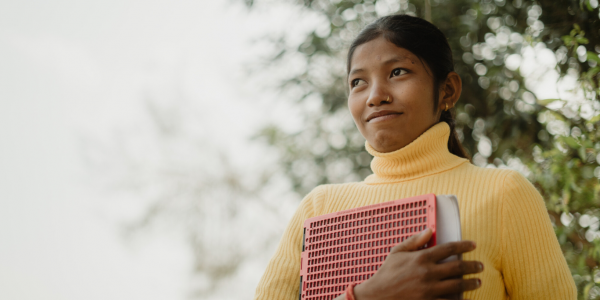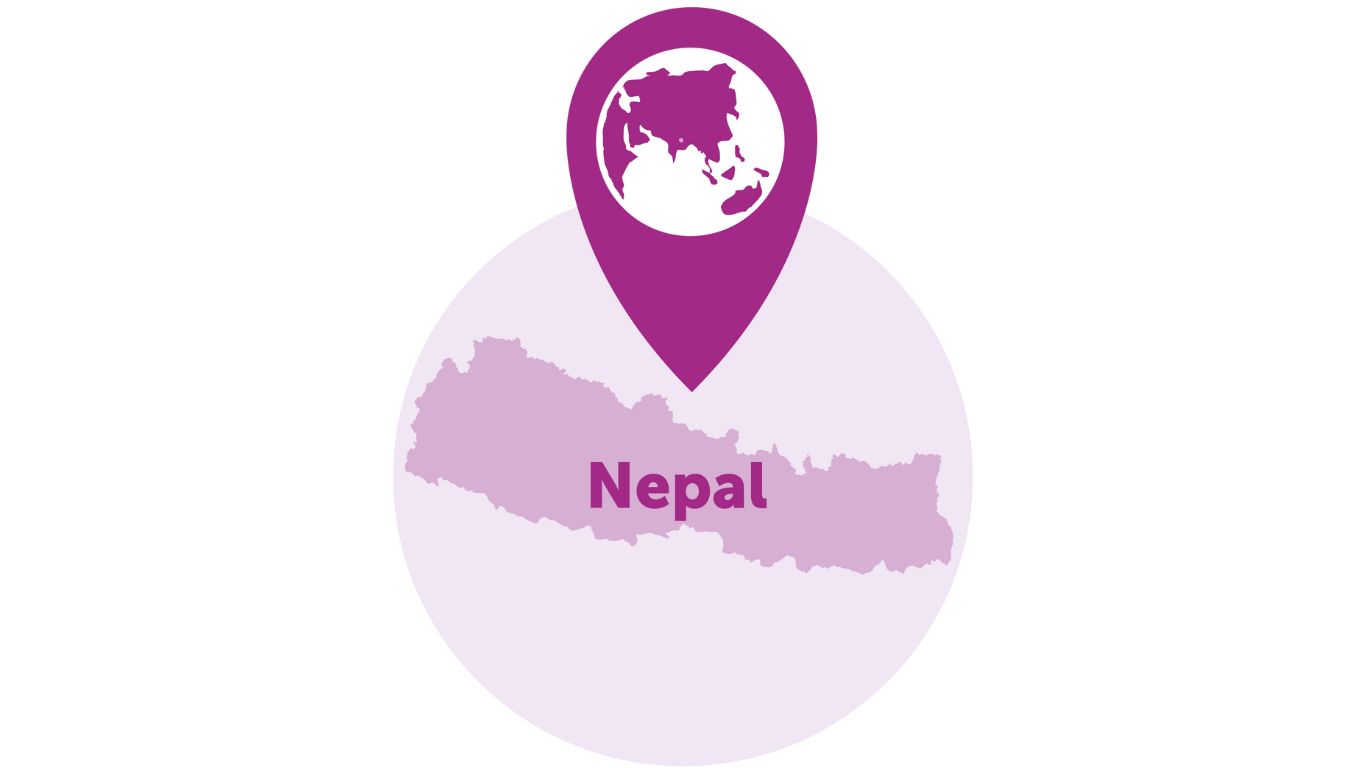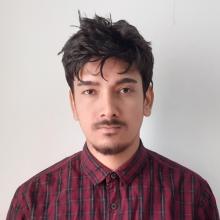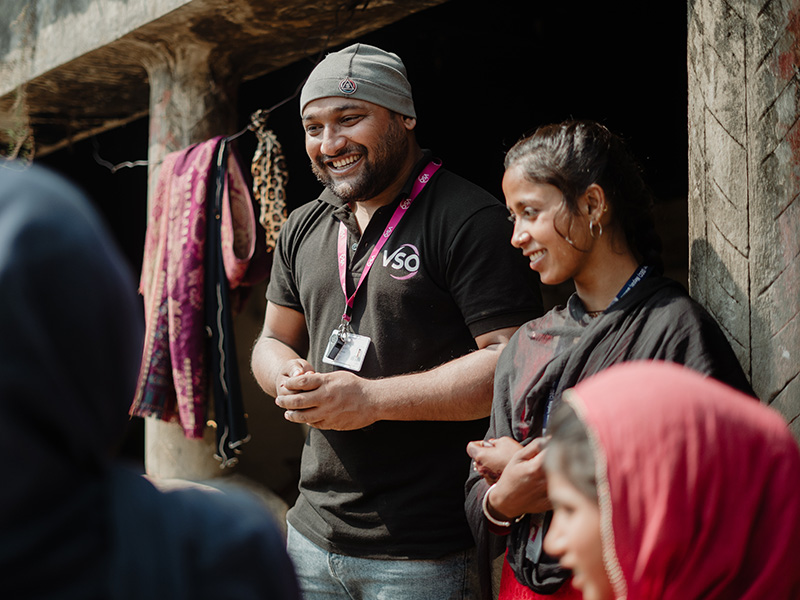
 Breaking down relationship barriers in Nepal
Breaking down relationship barriers in Nepal
Namaste! Raj here with your latest Sponsor a Volunteer update. Read on to find out how your support is continuing to change the lives of thousands of women and girls across Nepal.
February's featured volunteer

Namaste! My name is Raj Karki. I’m volunteering as a Diffusion Advisor on VSO’s Gender-Based Violence Prevention and Response project in Nepal. I’m looking forward to keeping you up to date with how we’re getting on and how your support is making a lasting difference to the lives of women and girls here.

I’m delighted to be volunteering with VSO and to have the opportunity to share my experiences with you all. I’ve been in my role of Diffusion Advisor for just over a year, which has given me loads of opportunities to learn and grow, as well as use the knowledge I’ve gained over the years. Thank you for standing with me and helping to make a positive impact in my home country.
It is unacceptable that more than one in four women in Nepal experience gender-based violence in their lifetime. With your support, my colleagues and I are leading a range of prevention activities to stop violence against women and girls here. We’re doing this by running interactive sessions with couples, families, community groups and leaders to challenge social norms that value men and boys over women and girls. Working alongside other organisations, we’re part of an incredible movement to create long-lasting change.
February '24 volunteer update

Our work to prevent gender-based violence across rural Nepal is continuing to gain momentum and create a lasting impact for women and girls here. My team and I have been getting out into communities to deliver as many sessions as possible throughout the winter months. Through these sessions we work with couples and community groups to challenge the harmful attitudes and social norms that can lead to gender-based violence and discrimination.
I recently had a chance to help facilitate workshops in the districts of Bajhang and Baitadi in western Nepal. These hillside regions are so picturesque, and I hear they are now covered in snow which must look spectacular. But, sadly, the area is badly affected by high levels of gender-based violence due to the damaging cultural norms there which continue to value men and boys over women and girls.
The good news is our work to tackle these norms and change behaviours continues to make a difference and has been greatly appreciated by local leaders across Nepal. So much so, they are now allocating budget to fund their own initiatives to reduce gender-based violence in their communities. It’s wonderful that our project is having a positive ripple effect that will continue to drive lasting change. Thank you so much for helping to make this possible.
I’ve also been busy analysing project progress and talking to the people involved to ensure we’re hearing directly from them about the difference VSO has made in their lives. I’m currently putting together a booklet of these stories from couples, families and communities. I think it will be a great way to show the incredible impact we’ve been able to have here, with your support.
Outside of work, I have lots of assignments to finish. Plus I have my written and viva exams to prepare for as I near the end of my Master of Psychology course. The pressure is on! I’ve been using all my holidays and weekends to get prepared, so I’ve really appreciated your words of support and encouragement.
Breaking down caste-based discrimination
You might have heard about the ‘caste system’ in Nepal, which involves grouping people into specific social classes. I believe it was originally intended to represent people’s profession but overtime it has become a basis for discrimination.
Being from the Chhetri caste, I’ve luckily not had to suffer this kind of discrimination myself, but I witnessed a lot of it growing up. I remember our parents would tell us to avoid people from so-called lower castes, such as the Dalits. We weren’t supposed to eat food from the Dalits or even allow them into our houses. Can you imagine? It’s terrible how they have been treated – as if they are dirty and not equal to others. Despite being illegal for over 60 years, the practice of caste-based discrimination still exists and has created violence and exclusion that has no place in Nepal today.
For women and girls already experiencing gender-based discrimination, being from the Dalit caste adds to their isolation from society. And the frustration felt by Dalit men about the poverty and oppression they face is often taken out on their wives. My fellow VSO volunteer, Nishita, has been running couple and group sessions in eastern Nepal to tackle both gender and caste-based discrimination within families and communities.

Bringing families and communities together
Nishita told me about one of the Dalit women, Kalinda*, who was suffering at the hands of her husband and in-laws. She wasn’t allowed to eat dinner with the family or even leave the home. But since VSO’s sessions, Kalinda has felt able to talk openly with her husband – even about traditionally taboo topics such as menstruation - and is now accepted by her in-laws. She also learnt where she could turn for free care and legal support.
Dalits like Kalinda wouldn’t normally be allowed into places with so called ‘higher’ castes, so our group sessions provide an important space for different communities to come together and break down barriers. I heard that some people are changing their harmful attitudes to others, thanks to these sessions. Couples like Ganesh and Geeta*, who used to throw water away if someone from a lower caste touched the pot, are now changing their outlook and behaviours. What’s more, they are urging others in their community to do so too.
These efforts, which you are making possible, are having a big impact here. I feel so inspired hearing how people across all castes are starting to change their attitudes, share their knowledge and advocate for change. Together, we’re helping communities break the cycle of discrimination and build a more inclusive society. Thank you.
*Pseudonyms have been used to protect identities

Thank you
For me, being a VSO volunteer is a life-changing opportunity to give back to my society and help improve the lives of women and girls here. Thanks to you, we have reached over 65,000 people to date and are taking huge strides in the fight against gender-based violence in Nepal. This is an unbelievable achievement that will continue to create a happier, healthier and more inclusive society for all.
None of this would be possible without your support. My VSO colleagues and I may be the ones delivering the work in Nepal, but we simply couldn’t do it without you. Together, we have created lasting change. On behalf of all of us, thank you for your incredible support - we appreciate it so much.
Warmest wishes,
Raj
P.S. Remember, you can ask a question or leave me a message below. I’d really love to hear from you!

Want to ask a question?
VSO’s Sponsor a Volunteer team will share your message with the VSO volunteer and get back to you with a response. Your email address will not be used, disclosed or transferred to any VSO personnel, it will be stored securely in accordance with VSOs privacy policy. A sample of messages including display names will be published to the Sponsor a Volunteer homepage each month.
Your latest questions answered

Namaste, thank you for your wishes and I am glad that we have supporter like you.
Raj

Thank you for your support too and staying in touch.
Raj

Namaste and thank you for supporting VSO. It’s your support that allowed volunteers like me to reach out to those communities and do the good things we did.
I am glad that you loved the letters and posts. It’s great to have supporters like you who are making the world a better place to live.
Take care and be happy too.
Raj.

Did you know?
We bring about lasting change not by sending aid, but by working through volunteers to empower communities in some of the world’s poorest regions. You can read more about VSO’s areas of work and discover more about our projects here.

More news from VSO
Learning for lasting peace: how social tension impacts education
For many of us, education is something that we often take for granted. Providing quality education and access to education for all is a tool that has proven to build a cohesive and fairer society.

